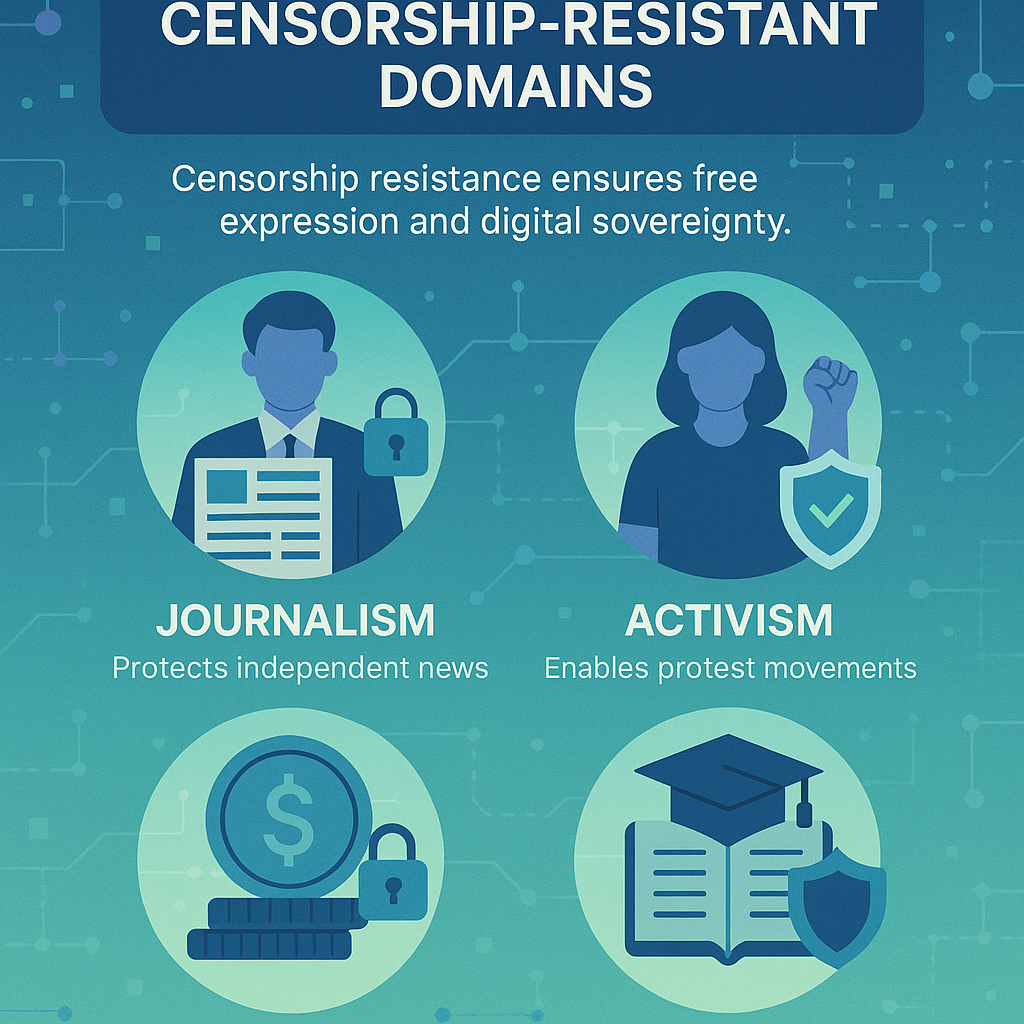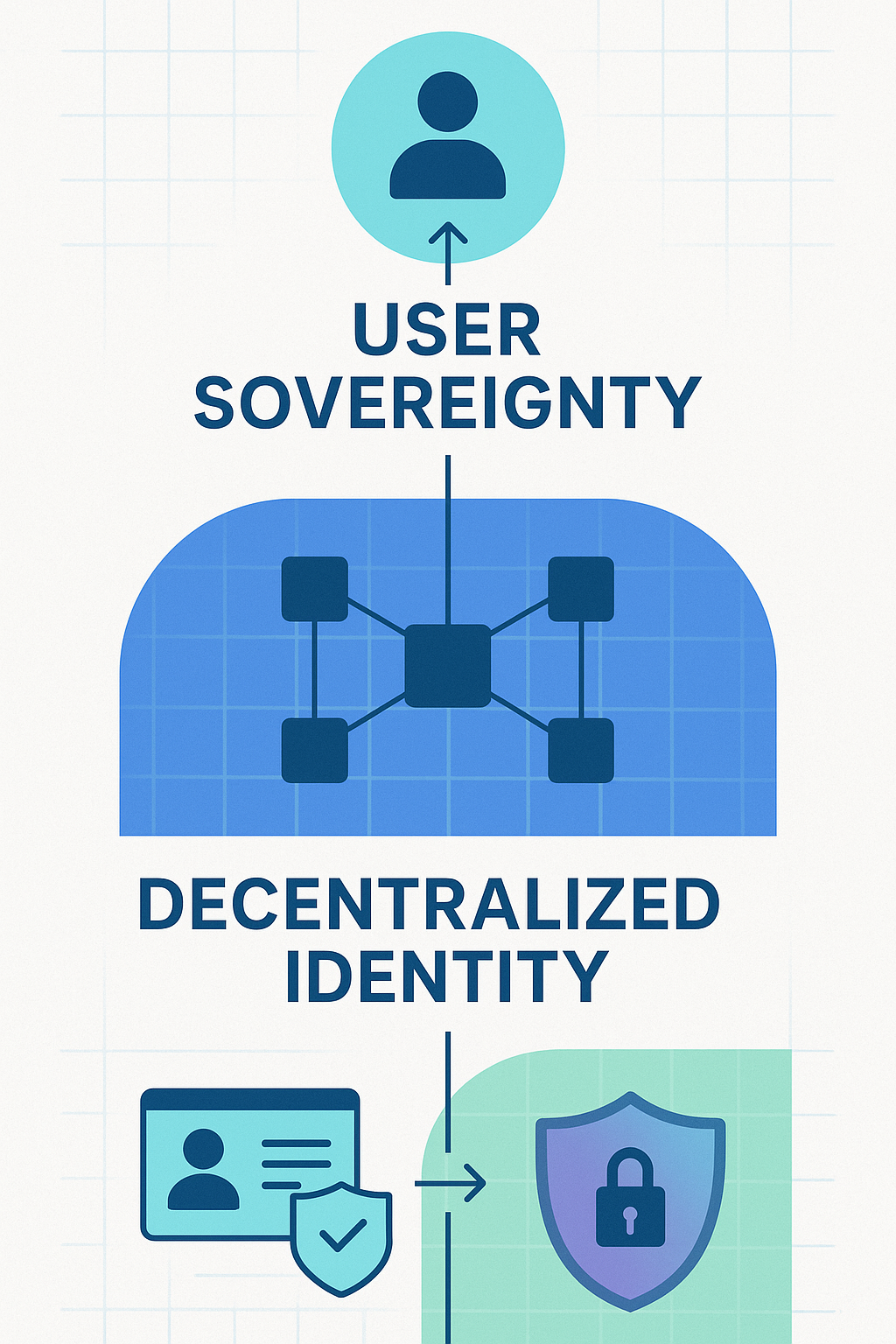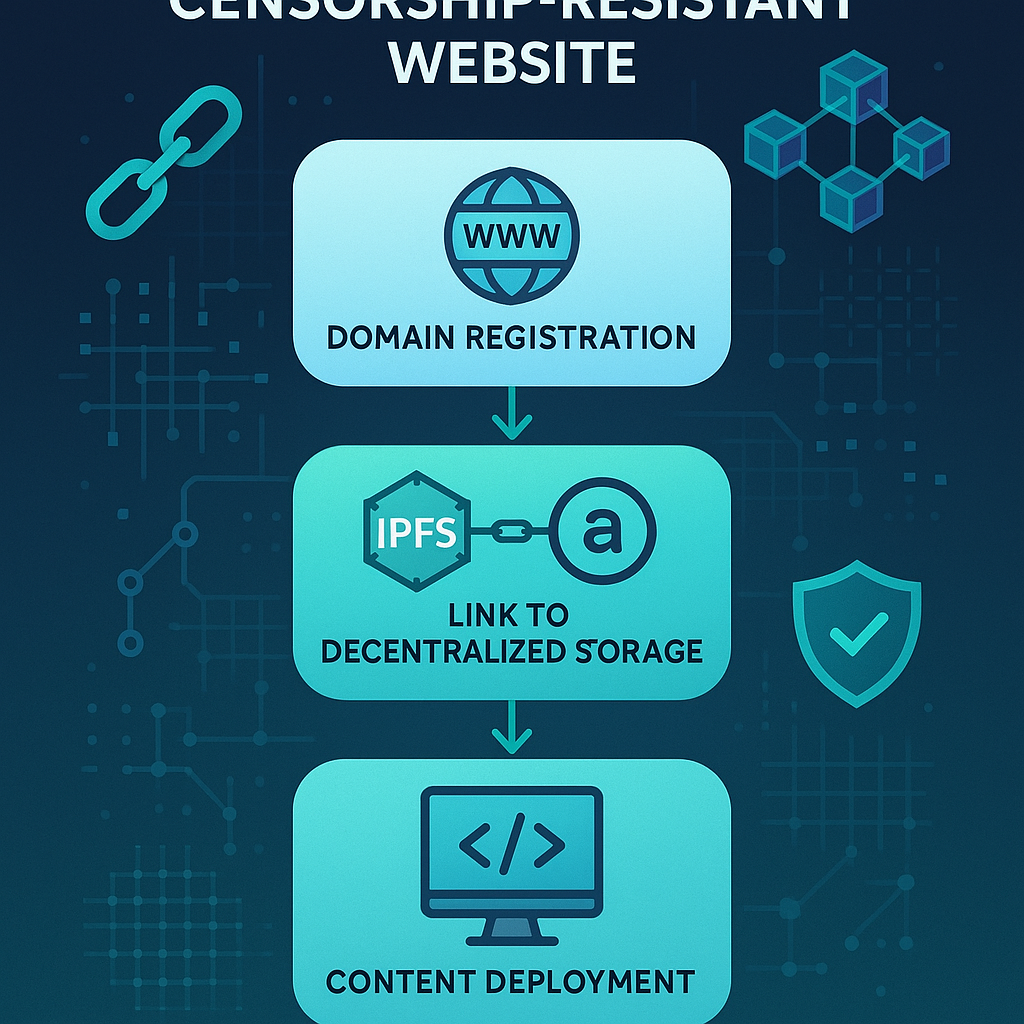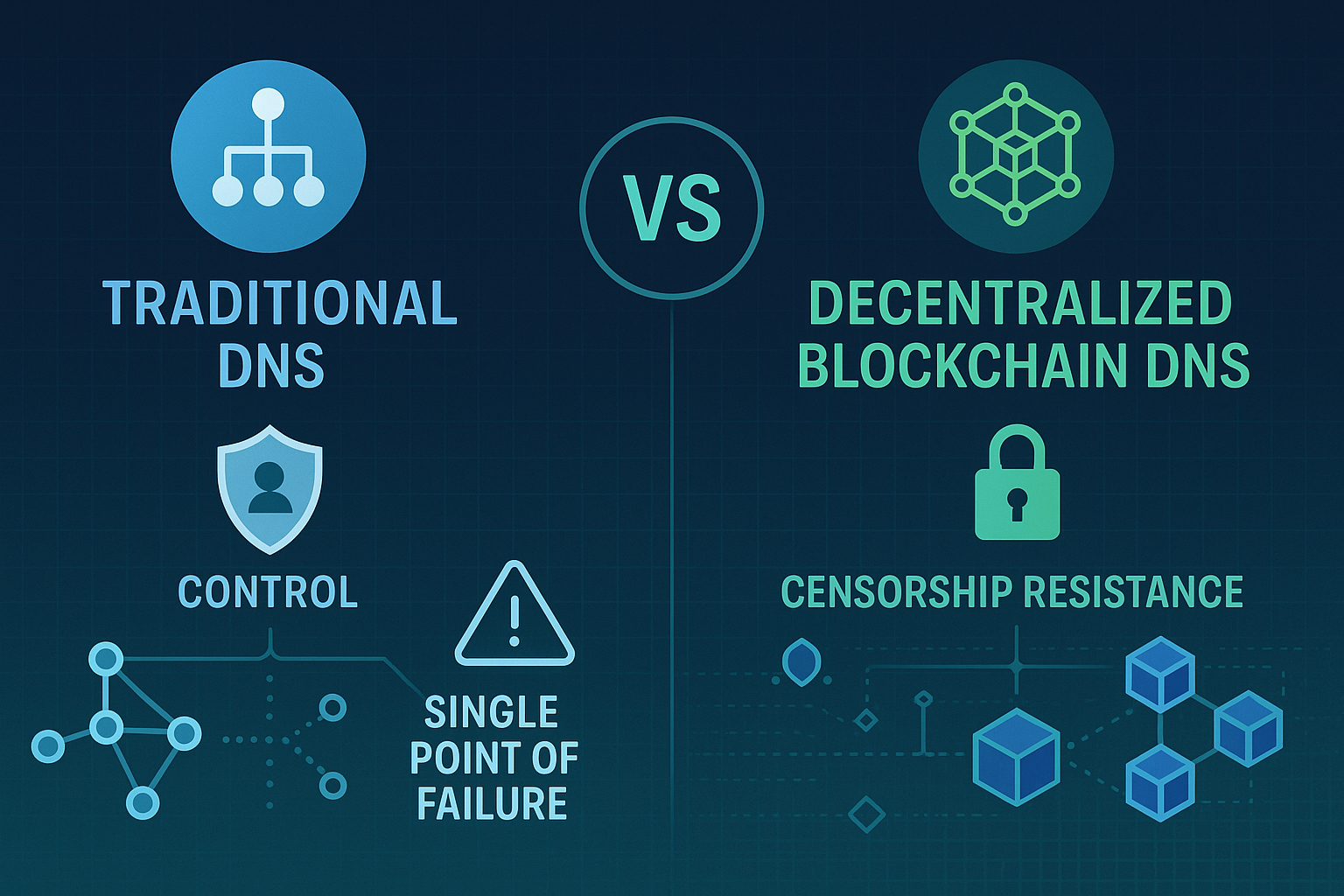Introduction
- Introduction
- How Decentralized Domains Prevent Censorship
- Industries Benefiting from Censorship-Resistant Domains
- Enhancing Freedom of Speech Online
- Platforms Supporting Censorship-Resistant Domains
- Setting Up a Censorship-Resistant Website
- Conclusion
Introduction
In the rapidly evolving digital era, the struggle for online freedom and censorship-resistant publishing has become more crucial than ever. Decentralized domains have risen as a transformative solution for anyone who values free expression, digital identity, and the ability to maintain an online presence regardless of external pressure. These domains operate outside the boundaries of traditional DNS control, harnessing the power of blockchain and decentralized storage networks to provide unprecedented levels of resilience, user sovereignty, and privacy.
For individuals facing information suppression, organizations defying media bans, and businesses seeking robust online integrity, decentralized domains are not just a technological advancement—they are an essential pillar of freedom of speech and digital sovereignty. By eliminating centralized points of failure, these domains make it significantly harder for authoritarian actors, corporations, or other centralized bodies to silence or erase digital voices.
This article will answer key questions, such as:
- How do decentralized domains for censorship-resistant publishing actually work?
- What gives them their unique power compared to legacy systems?
- Which industries have the most to gain from adopting them?
- How can anyone set up a censorship-resistant website using these tools?
- What are practical, real-world applications and success stories from the field?
By exploring these topics, you’ll gain actionable insight into how technologies like blockchain domains, decentralized identity credentials, and censorship-resistant publishing infrastructures are shaping the future of the web for creators, activists, and enterprises alike.
Overview of Decentralized Domains
Decentralized domains are digital addresses registered and resolved on blockchain-based networks rather than traditional centralized DNS servers. Unlike legacy domain systems, which rely on registrars like ICANN to manage and control access, decentralized domains eliminate single points of failure by distributing authority across a peer-to-peer network. This design allows users to map their domains directly to websites, wallets, or other resources in a way that is tamper-proof and censorship-resistant.blockchain domains provide stronger ownership, giving individuals and organizations complete control without needing permission from any central authority. In addition, these domains foster new digital identity paradigms and serve as gateways for deploying truly decentralized websites.
Importance of Censorship Resistance
Censorship resistance has become an imperative in today’s world, particularly for journalists, activists, and communities facing online suppression. Centralized systems can be subject to take-down requests, blocking, or manipulation, all of which undermine trust and accessibility. By leveraging decentralized domains, content publishers can protect their platforms from interference, ensuring that critical news, research, or dissenting voices remain available worldwide. This resilience bolsters not just freedom of speech but also the right to privacy, transparency, and a robust digital identity. For the Web3 community, and society at large, these domains lay the groundwork for an open, secure, and unbreakable internet.
Article Scope and Goals
This article aims to:
- Demystify the architecture and operation of censorship-resistant domains
- Explore major platforms and technologies sustaining Web3 TLDs and self-sovereign digital identity
- Showcase the benefits of decentralized publishing through case studies and real-world impact
- Provide practical steps for readers to adopt decentralized domain management and secure their content
Whether you’re a Web3 enthusiast, business leader, or digital rights advocate, you’ll discover how to use decentralized identity credentials and related tools to build resilient, censorship-proof presences for yourself or your organization.
How Decentralized Domains Prevent Censorship
Technical Architecture of Decentralized Domains
The unique strength of decentralized domains lies in their technical structure. Registers like the Ethereum Name Service (ENS) operate smart contracts on the blockchain to manage registrations, ownership, and domain records in a tamper-proof, permissionless environment.
Domains such as .eth or other Web3 TLDs are controlled by blockchain wallets, not centralized registrars. Every modification—transferring ownership, updating a content hash, or setting resolver records—requires cryptographic authentication, dramatically reducing the risk of domain hijacking or unauthorized interference.
Key features include:
- Ownership via private keys: Only the key holder can manage their domain
- On-chain records: Domain data (addresses, hashes, text records) is stored immutably
- Integration with decentralized storage: Websites and assets are referenced by content hashes on networks like IPFS or Arweave
This design ensures domains are governed by users directly, fostering unparalleled censorship resistance and full user sovereignty.
Blockchain vs Traditional DNS
The contrast between blockchain-based domains and traditional DNS reveals why the former are significantly harder to censor. Traditional DNS relies on centrally managed servers, overseen by registrars like ICANN, making domains susceptible to take-downs, blocking, or manipulation. In contrast, blockchain domain registrars like ENS or Unstoppable Domains embed domain ownership and records within an immutable, distributed ledger.
- Centralized DNS can be shut down, seized, or rerouted by authorities
- Decentralized domains exist on the blockchain, where no single entity can override ownership or erase content
By combining blockchain domains and decentralized storage, websites can remain live and accessible even when under attack from powerful adversaries—a breakthrough in digital autonomy.
Decentralized Storage Solutions
A critical component of censorship-resistant publishing is decentralized storage. Unlike traditional web hosts, which can be forced to remove content, protocols like IPFS and Arweave distribute website data across thousands of independent nodes.
- IPFS uses a peer-to-peer file system where each file has a unique content hash and can be “pinned” on multiple nodes for persistence
- Arweave offers permanent, blockchain-backed storage ideal for archival, unchangeable records
Best practices for maintaining resilience include using pinning services (like Pinata for IPFS), adopting redundancy through clusters, and verifying successful data replication. This creates a robust foundation for decentralized websites immune to individual server failures or targeted takedowns.
Industries Benefiting from Censorship-Resistant Domains

Journalism and Media
Independent journalism faces unprecedented threats—be it government pressure, hostile take-down demands, or digital erasure. By adopting censorship resistant journalism platforms, media outlets can deploy content on resilient networks immune to centralized censorship. Notable examples include media organizations using blockchain to preserve archives during the Hong Kong protests and to safeguard whistleblower evidence, thereby protecting press freedom and truth in reporting.
Activism and Human Rights
For activists operating in oppressive regimes, the risk of content takedown can mean silencing vital voices. Organisations have leveraged activism and human rights tools—blockchain DNS and decentralized websites—to document protests, share critical information, and build secure communication networks. Examples include Hong Kong protestors immortalizing archives on the blockchain and activists in China using Ethereum to bypass strict censorship regulations.
Finance and DeFi
Decentralized domains are essential infrastructure for the finance and DeFi sectors. DeFi projects benefit from uncensorable websites and addresses, ensuring continued access to decentralized exchanges, lending protocols, and blockchain-based financial tools—creating a more equitable, global financial system that’s free from centralized chokepoints.
Education and Gaming
Education and gaming platforms are beginning to harness decentralized identity and domain management to give users more control, enable secure credentialing, and maintain content accessibility. Whether securing digital diplomas or creating fair, interoperable games, decentralized domains add a layer of permanence, ownership, and resistance to tampering.
Enhancing Freedom of Speech Online

User Sovereignty and Digital Identity
A defining trait of the decentralized web is user sovereignty—the ability to maintain and control digital identity without third-party gatekeepers. Modern platforms offer robust decentralized identity credentials that empower individuals to curate, verify, and update their information securely on-chain.
With decentralized profiles:
- Users express a verifiable, tamper-proof digital persona
- Metadata (avatars, links, email, etc.) is updated via private key
- Digital identities become durable, portable, and resistant to unauthorized modification
This empowers freedom of expression and self-definition across platforms, fostering greater autonomy and trust in digital interactions.
Censorship Resistance in Practice
Censorship-resistant domains have proven their power in the field. For instance, during major protests and information blackouts, journalists and activists have used decentralized domains to mirror news archives, breaking through government barriers. Decentralized storage ensured that even when primary sites were blocked, mirrored or blockchain-hosted versions remained reachable—giving suppressed voices a lasting channel for communication and information sharing.
Over 30% of active creators used tokenized or decentralized platforms for content distribution in 2024, with the ecosystem’s market size projected to surpass $2 billion in the coming years.
Case Studies and Real-World Impact
Platforms such as Reuters and other major media have adopted decentralized credentials to sign and authenticate data, making archives traceable and tamper-evident. Activists world-wide now store critical documents and uncensored reports on decentralized websites, ensuring their voices are never erased.
Reuters’ Authenticity POC is a strong example: photojournalist images are cryptographically signed and anchored on-chain, ensuring they cannot be altered or suppressed, and provenance can always be verified (see Reuters Authenticity POC).
Platforms Supporting Censorship-Resistant Domains
Ethereum Name Service (ENS)
The Ethereum Name Service is a leading solution for blockchain-based, censorship-resistant domains. ENS lets users register .eth domains and map them to wallets, websites, or metadata securely. Domain management is handled via smart contracts, meaning only key holders can update records or transfer ownership—reducing hijacking risk. ENS also integrates with decentralized websites, leveraging IPFS for storage. Users can manage profiles, update content hashes, and extend registrations entirely on-chain via the ENS domain management dashboard.
Unstoppable Domains and Handshake
Unstoppable Domains and Handshake offer alternative blockchain-based domain systems with a focus on user control and anti-censorship. These platforms register domain addresses (like .crypto, .zil, etc.) directly on blockchain ledgers, enable DApp integration, and support direct linking to decentralized storage. Customers gain true ownership, eliminating dependency on classic DNS and centralized authorities, making it much harder for malicious actors to seize or block domains.
Decentralized Storage: IPFS and Arweave
Protocols like IPFS and Arweave underpin the core resilience of decentralized publishing. IPFS distributes site files by content hash and allows users to “pin” copies for persistence. Arweave stores files permanently after a single, up-front fee—making it ideal for archival or mission-critical sites. Both protocols integrate with leading domain systems, providing the backbone for setting up decentralized websites.
Distributed Press and Other Tools
Platforms like Distributed Press equip creators to publish, monetize, and control digital content directly on decentralized infrastructure. Distributed Press bridges the gap between traditional and decentralized publishing, allowing users to deploy, manage, and monetize content on blockchain-powered, censorship-resistant networks.
The token economy is redefining digital ownership, transparency, and the value flow between creators and their fans — ensuring creators maintain autonomy over their work.
Setting Up a Censorship-Resistant Website

Domain Registration and Management
To get started, users must first register a decentralized domain, such as on ENS or Unstoppable Domains. Best practices include safeguarding private keys in secure wallets, verifying the legitimacy of registrar platforms, and configuring domain settings for maximum security (blockchain domain registrars). Domain owners should regularly check for unauthorized changes and keep rigorous control over permissions using multi-factor authentication if possible (ENS domain management).
Hosting Content on Decentralized Storage
Once a domain is secured, the next step is hosting website files on a network such as IPFS or Arweave. For IPFS, use reputable pinning services or run your own node to ensure content persistence. Arweave is optimal for files needing immutable storage—upload once, and your data is preserved indefinitely. Combining storage strategies maximizes resilience and accessibility.
Linking Domains to Content Hashes
With content in place, link your blockchain domain to the storage network by updating the domain record with the content hash (for example, set the ENS “content” field to the IPFS hash). This step ensures that entering your domain directs browsers and DApps to the correct decentralized content, bypassing conventional DNS resolution. This integration underpins setting up decentralized websites.
Editing Profiles and Managing Identity Credentials
A critical final step involves curating your on-chain presence using features like decentralized identity credentials. Update profile data, add avatars, or link additional sites—all secured by your domain’s private key and visible across supporting DApps. Robust Web3 domain management interfaces allow ongoing profile edits, enabling evolving, verifiable, and expressive digital presence.
Conclusion
Decentralized domains and censorship-resistant publishing stand at the forefront of the battle for online autonomy. By building on blockchain, leveraging decentralized storage solutions, and prioritizing user sovereignty, these innovations empower users to maintain durable, tamper-proof, and expressive digital identities and content.
Across journalism, activism, DeFi, education, and gaming, the practical benefits of adopting censorship-resistant domains are becoming clear—from safeguarding crucial information to promoting equitable, open access to the web.
Now is the time for creators, organizations, and anyone concerned about freedom of speech to embrace decentralized domain technologies. By registering a blockchain domain, deploying content via decentralized websites, and curating robust digital identities, you not only protect your voice, but also contribute to a stronger, freer, and more resilient Internet for all.
Empower your digital presence today by registering a decentralized domain and building a censorship-resistant website to protect free speech and ensure your content remains accessible. Start exploring decentralized domain platforms now.
Resources
- Create a Decentralized Website | support.ens.domains
- What is ENS? | support.ens.domains
- Decentralized Websites: How Do They Work
- Build a Permanent Website for Your Small Business with AR.IO
- Distributed Press – Distributed Press
- The Expanding Ecosystem of Web3 TLDs: From .eth to .dao, What’s Next?
- Decentralized science (DeSci): definition, shared values, and guiding principles
- Home Page | d3.inc
- ICANN vs. Web3 Registrars
- Managing a name
- How to Edit Profile

Leave a Reply